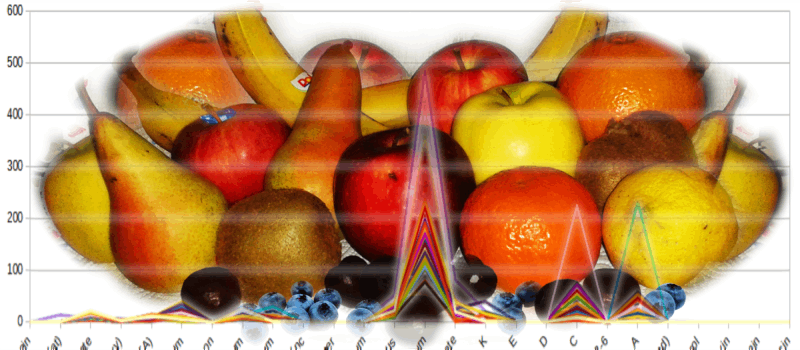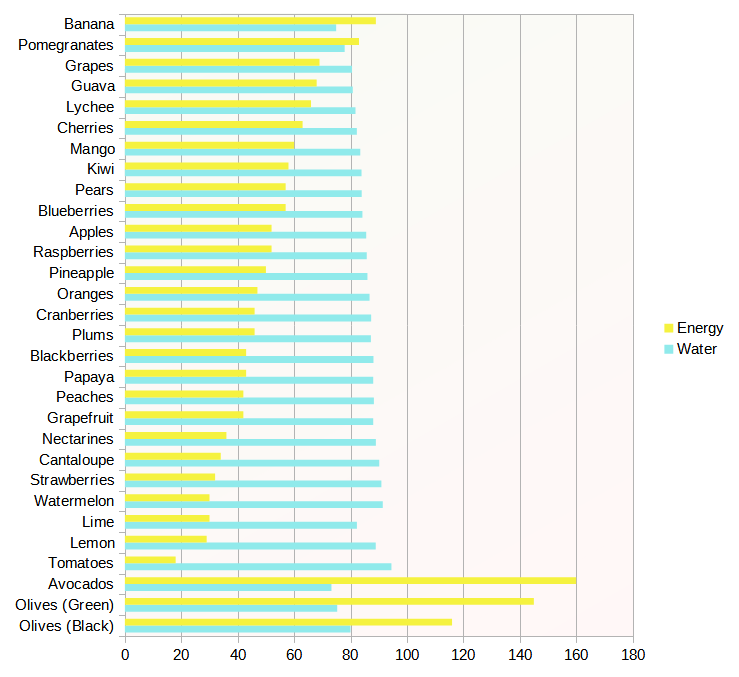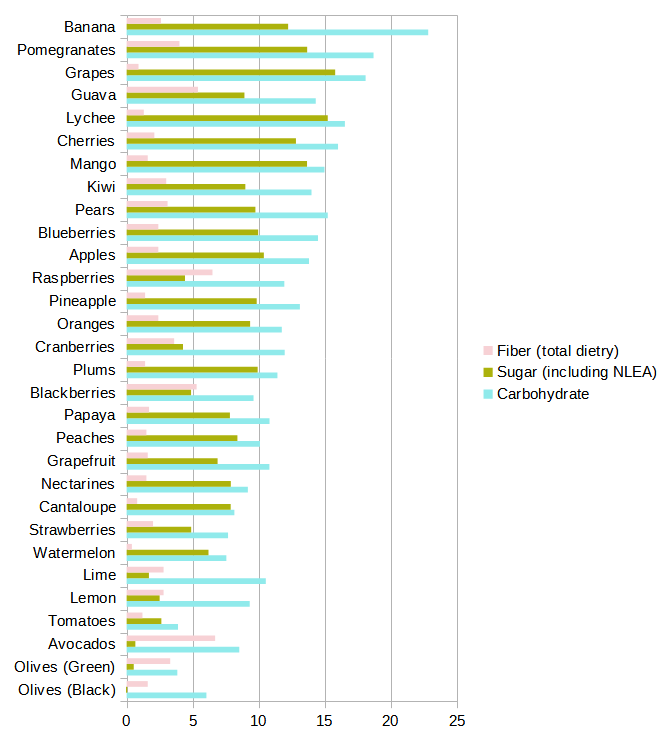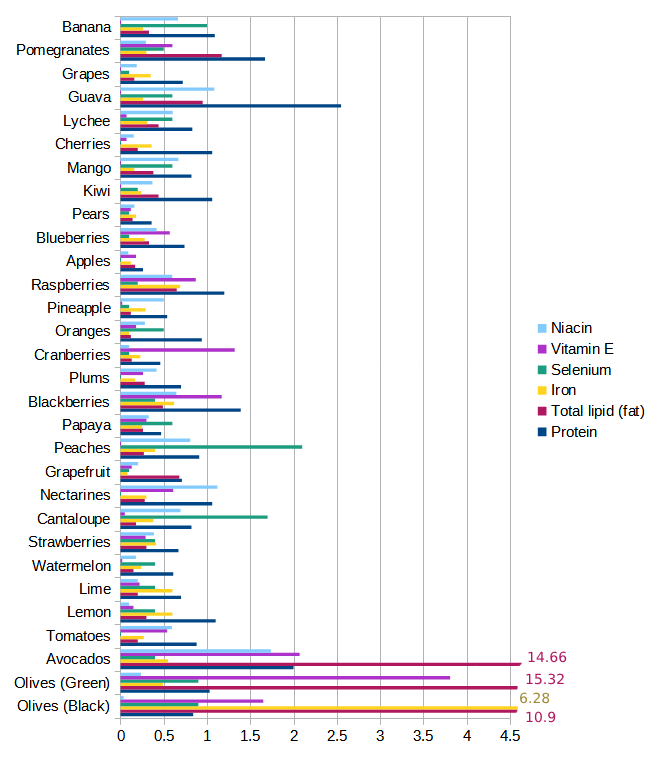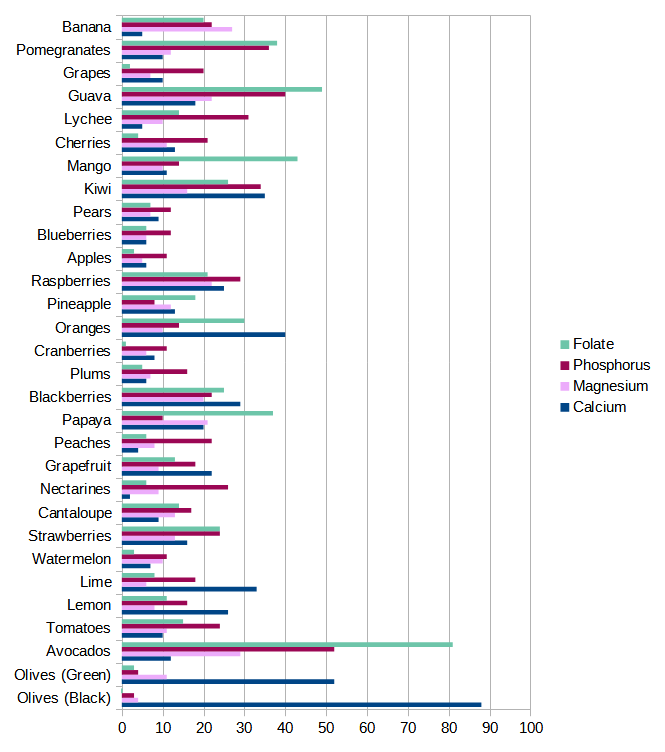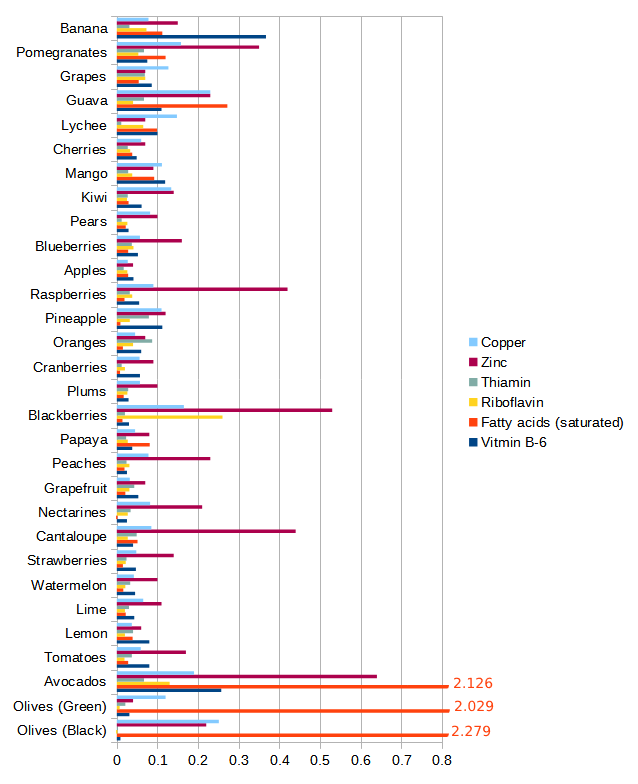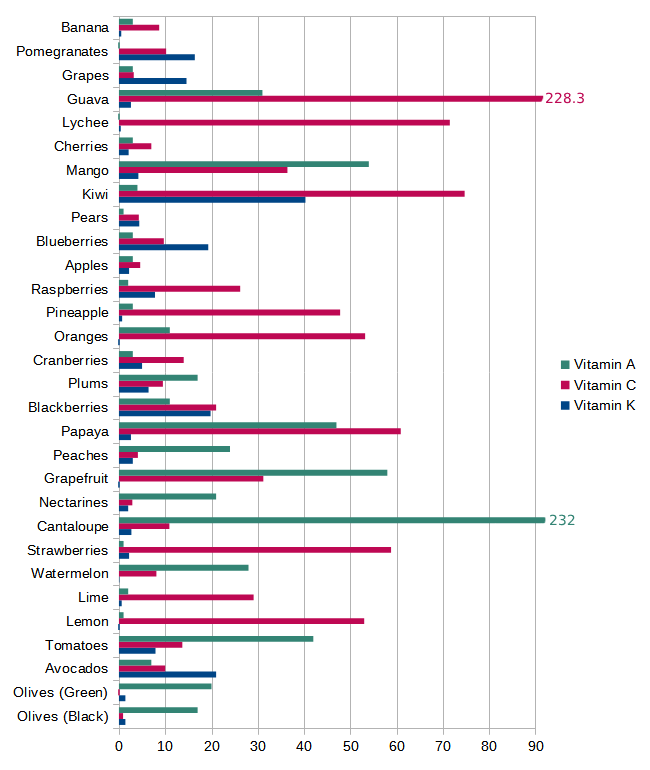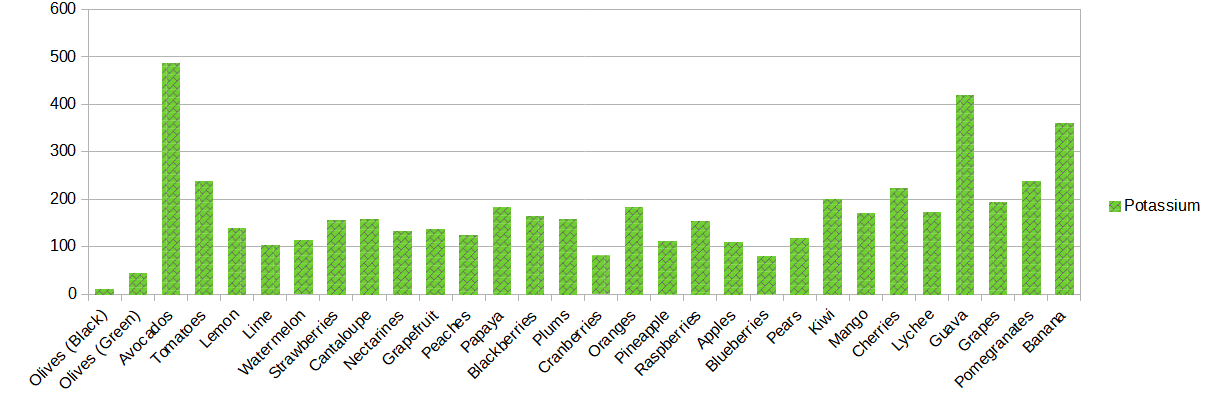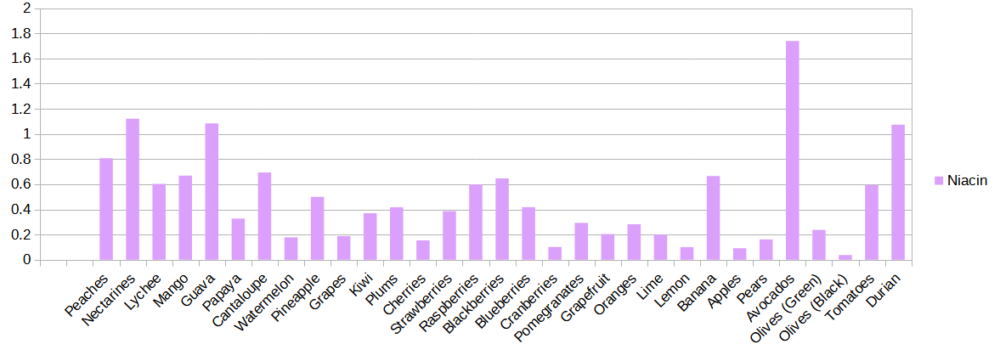So, today I came across this particular question and it got my creative juices going. I am a fruit bat and I do enjoy fruit, so what is the healthiest fruit, the best fruit, the queen of fruit if you will? I bet this will not be an easy question to answer, however, I’m gonna try to fly around, see what I sniff, and let you know my conclusion.
Our Contestants
Just as I thought this required massive research… even more than I expected so I will be dividing this into two blogs. In today’s blog, we’re gonna have a look at some of the best fruits mentioned on some sites I’ve researched as well as have a table and some graphs to try to find the fruit with the most nutrient value (at least the fruit from the ones mentioned in the research and a few others that crossed my mind and were available in a survey I looked into. I noticed a discrepancy in the values when cross-referencing surveys so I stuck to one that had the most nutrients mentioned and specified that the fruits were studied raw, I think all were mentioned as raw except for the olives – probably because we eat them treated not directly from the tree as we do with the other fruits. Yes, just like tomatoes, and avocados, olives are fruit!) So, let’s get to the list of fruits and their benefits first as from the data gathered from the sites (as I mentioned before the table will contain a slightly varied list of fruits than the ones down here but the majority are both here and on our table. Also, after finishing the table, some fruit that was mentioned as having a high content in certain nutritional values were found in the average category on the table, but we’ll discuss that again in the conclusion).
- Apples– An apple a day keeps the doctor away, but why? They contain quercetin, an antioxidant that protects the brain cell from degeneration thus preventing Alzheimer’s. Their antioxidants activity increased bone density. They also have antioxidants that can promote heart health, reduce the risk of type 2 diabetes, and the risk of cancer. Rich in fibers, like pectin, a prebiotic fiber that feeds the good bacteria in your gut and helps improve digestion and metabolic health. Their skin is rich in disease-fighting compounds like flavonoids. They have phenolic compounds that help reduce cholesterol. Also, a good source of phytochemicals, potassium, Vitamin C, Vitamin K, and contain some B vitamins too.
- Avocados – As you can imagine, avocados have a low sugar content and are filled with fatty acids and potassium, both of which are well-known for their role in promoting heart health. The majority of the fat in avocado is actually oleic acid, a monounsaturated fat linked also to reducing inflammation. They are also rich in magnesium, the key mineral linked to neurological and muscular health.
- Blackberries – These are tiny but packed morsels of Vitamin C, Vitamin K, and manganese. Their antioxidants not only reduce inflammation but prevent aging in your arteries, and thus help protect you from chronic illnesses such as heart disease and cancer. They’re a good source of fiber and bursting with nutritional minerals.
- Blueberries – These little fellows are a burst of fiber, polyphenolic compounds, antioxidants, and Vitamin C. They contain anthocyanin and Vitamin K that help to boost your brainpower, have anti-aging properties, and also fight against heart disease, diabetes, and Alzheimer’s. Blueberries also help defend you against oxidative stress and viral infections while boosting your immune system.
- Banana – They are renowned for their high content of potassium, however, they are also a good source of magnesium, manganese, Vitamin C and Vitamin B6. They contain fiber that helps lower cholesterol, and pectin which may Improve blood sugar control and aid your digestive health. The carbs in green, unripe bananas consist largely of resistant starch, which may also improve blood sugar control and make you feel full. The high carb and mineral content of bananas make them a great source of fuel before exercise (maybe not so ideal if you are not going to exercise? However, if you need to increase your energy they might be a good healthy boost).
- Cantaloupe – This hydrating fruit is packed with potassium, folate, and Vitamin C, boosts immunity, and has anti-inflammatory properties. It may also stabilize your blood sugars. It also has anti-coagulant properties which help blood flow and prevents blood clots. Also, the beta carotene found in cantaloupe lowers the risk of cataracts, thus preserving good eyesight.
- Cherries – These are a delicious source of quercetin, a flavanol that helps calm you down, and melatonin, a hormone that signals your brain when it’s time to sleep, so cherries may help treat insomnia and other sleep disorders. They are also rich in potassium, fiber, and Vitamin C. They are also a good source of antioxidants including anthocyanins and carotenoids, which reduce inflammation and may help prevent several diseases.
- Cranberries – These little berries are filled with antioxidants, Vitamin C, Vitamin E, Vitamin K1, copper, and manganese. However, what makes cranberries unique from other fruits is that their juices and extracts help prevent urinary tract infections. A-type proanthocyanidins are the compounds thought to be responsible for this effect, as they can prevent bacteria from attaching to the lining of the bladder and urinary tract. Excessive intake, however, may cause kidney stones.
- Durian – This fruit is nicknamed the king of fruit, rich in Vitamin C, B vitamins, copper, folate, manganese, and magnesium, as well as several healthy plant compounds that function as antioxidants. It is rumored that this plant may help in the treatment of digestive ailments, cardiovascular diseases, and issues with blood sugar and blood pressure levels. Durian also contains a relatively high amount of protein compared to other fruit.
- Grapes – Great little bites of Vitamin K, that help the bone tissue, and Vitamin C. Grapes contain anti-inflammatory properties, reduce blood pressure, and are a good source of potassium. The antioxidants found in grapes, like anthocyanins and resveratrol, not only reduce inflammation but also may help protect your heart, brain, eyes, and joints. (Apparently, grapes may be toxic to dogs. Poor dogs, we fruit bats adore grapes!!!)
- Grapefruit – An awesome source of Vitamin C, Vitamin A, fiber, and potassium. Grapefruit is known to lower cholesterol and improves blood pressure, reduce insulin resistance, prevent kidney stones, and aid weight loss. Regular intake might interfere with prescription drugs, so do consider that.
- Guava – This fruit is rich in fiber, folate, potassium, copper, manganese, vitamin A, and Vitamin C. The antioxidants in guava have been shown to protect cells from oxidative damage, indicating that they may help reduce the risk of chronic disease. They help boost the immunity system and are a great source of pectin, which benefits digestion and may help prevent colon cancer.
- Kiwi – A great source of Vitamin C, loads of antioxidants, and high in fiber, that with a glass of water is excellent for your digestive system (and weight loss). Kiwi is also high in potassium, folate, magnesium, and Vitamin B. I also found out that apparently, the skin is even better than the fruit when calculating health benefits! So stop throwing the best part away!
- Lemon – As you may assume, lemons are packed with Vitamin C and citric acid, the latter mentioned to be strong enough to treat kidney stones. Not such a surprising theory since lemons have been used in folklore remedies to treat countless diseases! They are also filled with folate, potassium, and flavanoids that protect brain cells from damage and thus reduce cognitive decline. They show the potential to lower blood lipids and blood pressure thus promoting good heart health. Their plant compounds may also help prevent weight gain.
- Mango – Packed with beta-carotene that the body can convert to Vitamin A, antioxidants, Vitamin C and Potassium. This fruit has great anti-inflammatory properties, promotes a healthy immune system, and sharp vision. Mango also contains soluble fiber and can protect against diabetes.
- Olives – These are a good source of vitamin E, iron, copper, and calcium. Olives also contain a high amount of antioxidants, which may help prevent heart disease and liver damage, as well as have anti-inflammatory effects. Similar to avocados, olives contain oleic acid, which provides several health benefits for your heart and may help with cancer prevention. Olives also promote healthy bones and reduced the risk of osteoporosis.
- Oranges – Of course, you know oranges are mostly renowned for their Vitamin C, however, they are also a good source of potassium and antioxidants. Oranges contain high quantities of B vitamins such as thiamine and folate flavonoids, and carotenoids, and citric acid that may reduce the risk of kidney stones, increase iron absorption and prevent anemia. They also have anti-inflammatory and anti-cancer properties.
- Papaya – A burst of Vitamin A, Vitamin C, folate, and potassium. It also contains papain, an enzyme that makes protein easier to digest and thus improves digestion. Papaya is also rich in the anti-cancer antioxidant lycopene. For some reason, the body seems to prefer lycopene from papayas to any other lycopene, which may be due to its other enzymes and nutrient values.
- Peaches and nectarines – As resource values, they do vary from one another, however, they seem to help with the same benefits. They are both high in potassium, boost nerve and muscle health and their skin is a good source of antioxidants.
- Pears – A good source of hydration and fiber, pears may regulate bowel movements and can reduce the chances of constipation as well as diarrhea and loose stool. If you are careful about your weight, pears are one of the lowest-calorie fruits so that may be a bonus for you. Their antioxidant components of Vitamin C, Vitamin A, and flavonoid compounds like beta-carotene, lutein, and zeaxanthin can also help rid your body of free radicals.
- Pineapple– A good source of bromelain and anti-inflammatory enzymes, pineapples help reduce the risk of cancer, heart attack, and strokes. They are rich in vitamin C and manganese.
- Plums – These are a good source of anti-inflammatories. Dried prunes have even more calcium and magnesium than fresh plums, helping even more to prevent osteoporosis and thus maintaining healthy bones. It also a well know fact that prunes help to regulate your bowel movements.
- Pomegranates – Apparently these have a mega dose of antioxidants, contain fiber and potassium, and help cardiovascular health as well as lower inflammations, and the risk of cancer. However, regular significant intake might interact with prescription drugs so keep that in mind.
- Raspberries – These tiny bites are also high in fiber and antioxidants. They are known for their blood sugar-stabilizing benefits especially when combined with a protein intake. They are rumored to help prevent cancer, promote a healthy heart and also increase fertility and protect the embryo in the early months.
- Strawberries – High in antioxidants they help prevent chronic diseases. Strawberries are packed with Vitamin C, manganese, folate, and potassium. Compared to other fruits, they have a relatively low glycemic index thus they should not spike blood sugars. They are also rumored to prevent cancer and tumor formation.
- Watermelon – As you can guess watermelons have a high concentration of water and thus are great for hydration. They also contain a great amount of potassium and magnesium helping to eliminate excess sodium. Watermelons are rich in Vitamin A and Vitamin C, and also some important antioxidants like carotenoids, cucurbitacin E that helps to inhibit tumor growth, and lycopene that reduces the risk of cancers in the digestive system, cholesterol and lowers blood pressure.
But which is the best fruit?!
Well, from the list above I have noted that most fruits have similar health benefits. Plenty of antioxidants, Vitamins, anti-inflammatories, digestive benefits, and heart health. According to our table, none of them seems to contain cholesterol, sadly nor any Vitamin D. Few fruits seem to have particular benefits so how do you choose? Well, I guess it depends on what you are looking for! If you are eating a high quantity of fruits you may want to actually find fruits that have lower nutritional values as an excessive intake of most vitamins and minerals can also cause damage! If on the other hand you don’t like fruit and want to simply add one or two for the health benefits, then you may want to choose fruits on the highest end of nutritional value.
It also varies on your personal health and needs. Some fruit may be better for people with diseases or tendencies (like fruit with low sugar levels for diabetics). This article got me thinking further, to be able to decide what is best for you, one should have an idea of what each component does. However, that will be something that I will keep in mind and try to dive into in the future. For today, I will add some charts and a tables for you to be able and judge the fruits for yourself. (Don’t judge them too hard, ok!?)
Follow the link to the Nutritional Information Table.
And as promised here are some charts that I did my best to try and fit the data in as clearly as I can! Wasn’t easy but it’s somewhat visible.
My personal recommendation?
Vary as much as you can! So many benefits and lovely flavors out there, why would you want to stick with just one?! Find recipes and include fruits in your salads and daily recipes. Also, fruits come in seasons, so I wouldn’t go out of my way to buy fruit out of season. Benefit from the ones available at the moment, it’s usually tastier and cheaper too!
Also! Do blood tests regularly when changing your diet, especially if you are on medications! Some fruits are strong enough to affect your medications so always keep that in mind. Also, keep an eye for allergic reactions, some fruits may induce rashes and other side effects!!

